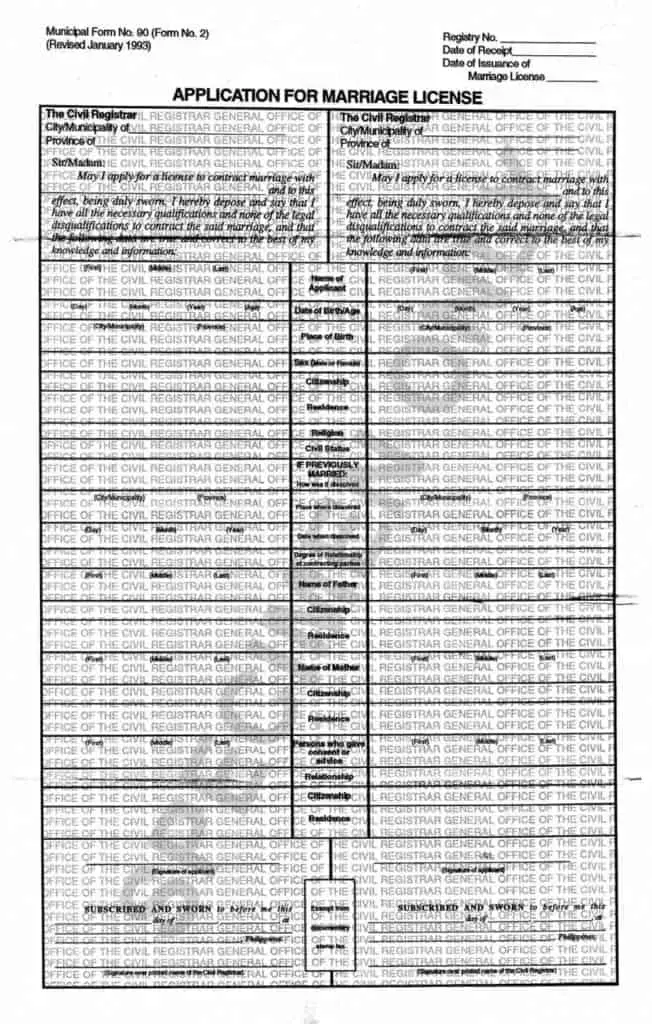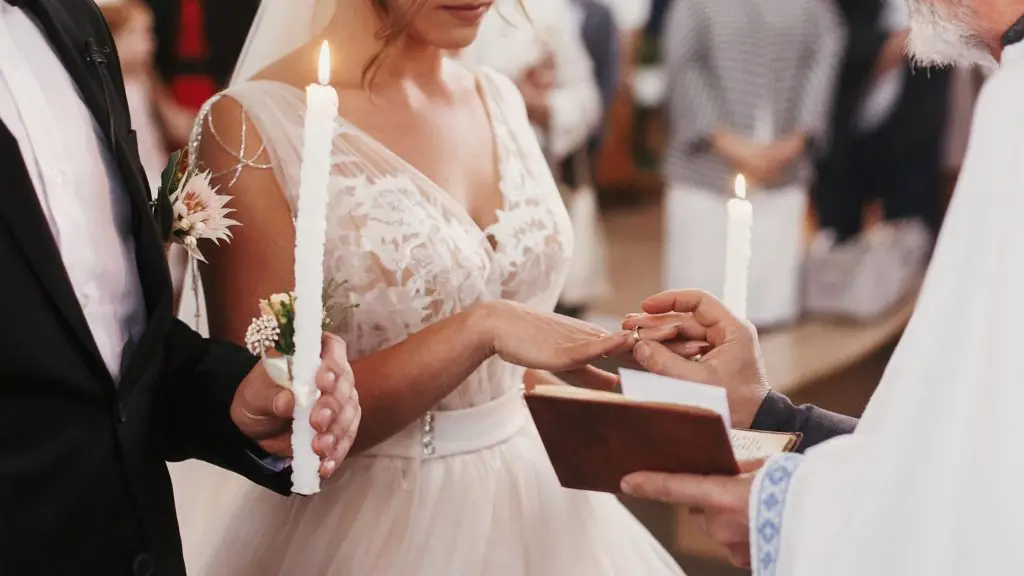
Everyone has a dream wedding. It’s an important milestone you’ve waited for all your life. Whether it’s a simple civil wedding or an extravagant church wedding, you can’t wait to celebrate this day with your soulmate and loved ones. But preparing for your wedding day is not a walk in the park. You must also know how to get married in the Philippines (i.e., the marriage requirements and preparations required to ensure a hassle-free celebration). There is no need to fret if you’re clueless about how to tie the knot in the Philippines. We have scoured the internet for the best information that every soon-to-be couple should know.
DISCLAIMER: This was written in collaboration with Atty. Kareen Lucero to ensure the accuracy of every legal element discussed in the article. It has been written for general informational purposes only and is not legal advice or a substitute for legal counsel. You should contact your attorney to obtain advice with respect to any particular issue or problem. The use of the information contained herein does not create an attorney-client relationship between the author and the user/reader.

For a detailed discussion of each requirement, scroll down to read the in-depth civil and church wedding guides we’ve prepared.
The legal age for marriage in the Philippines is 18 years old.
Art. 5 of the Family Code of the Philippines 6 provides that any male or female of eighteen years or upwards not possessing any impediment to marry under Sec. 37 and 38 of the Family Code may get married.
If you plan to marry in the Philippines, you must first know a few legal requirements, especially if you or your spouse is 25 or below. To summarize:
Marriages between the following are incestuous and void from the beginning, whether the relationship between the parties is legitimate or illegitimate:
The following marriages shall be void from the beginning for reasons of public policy:
After confirming that you are qualified to get married, proceed to the succeeding steps.

A civil wedding in the Philippines (kasal sa huwes) may not give you that royal wedding vibe, but it ticks all the boxes regarding convenience and cost-effectiveness.
Not that a civil wedding should be plain, boring, and second-rate.
With great planning and creativity, you can turn your civil wedding into a great experience you’ll treasure for years.
In this guide, we’ll teach you how to plan a civil wedding in the Philippines like a pro, plus tips to make it extra special without breaking the bank.
If you’re having seconds thoughts about having a civil wedding in the Philippines, let the following reasons do the convincing:
Although local civil registrars in the country tend to interpret the guidelines differently when issuing a marriage license, there are basic requirements you need to obtain to have a civil wedding. Make sure you have an original copy and photocopies of the following standard civil wedding requirements:
The legal age for marriage in the Philippines is 18.
For applicants between 18 and 20 years old, a notarized affidavit of parental consent to marriage is required. The father, mother, or guardian (in the order of mention) can either personally appear with a valid ID (original and photocopy) or provide a notarized affidavit.
Meanwhile, for applicants between 21 and 25 years old, a notarized affidavit of parental advice to marriage is required. The parents or guardian must show up with a valid ID (original and photocopy) or provide a notarized written account expressing that they know the couple’s intent to marry and any other advice they wish to give.
Forms are usually available at the local civil registrar/city civil registry department, where you’ll apply.
Suppose the parents refuse to provide notarized parental advice. In that case, you may submit a sworn statement telling why they refused, after which the marriage license can only be issued three months after you applied.
The marriage license is the most important legal document you must secure when preparing for your wedding. After all, without this, you won’t be allowed to have a church or civil wedding.
To apply for the license, both parties must go to the local civil registry of the city, town, or municipality where either one habitually resides.
The marriage license is usually released 10 days after you apply for it.
Local civil registrars tend to interpret the guidelines differently. Depending on where you’ll be applying, it may take either ten consecutive days (including weekends) or ten working days (excluding weekends) before the license is issued to you. However, the law is clear (Article 17 of the Family Code) that the waiting period for the marriage license should be ten consecutive days.
Any applying party can pick up the marriage license from the local civil registry. No delivery option is available as of this writing.
Once issued, the marriage license can be used wherever you want to get married in the Philippines.
However, it is only valid within 120 days of issuance and “shall be deemed automatically canceled at the expiration of said period if the contracting parties have not made use of it.”
Below is a more detailed discussion of the basic civil wedding requirements.
You can obtain this from the Philippine Statistics Authority (formerly NSO) office or through an online application via PSA Serbilis.
If there is no birth record, the latest original copy of the baptismal certificate may also be accepted. Foreigners must obtain their birth certificates from their country of origin.
For couples over 25 years old, the CENOMAR proves that neither of you was married. To secure a copy, please follow the same procedure in ordering a birth certificate. A copy of CENOMAR costs ₱210 (walk-in) or ₱430 (online).
Proceed to your municipality’s Commission on Population and Development (POPCOM) office to secure a schedule for your pre-marriage seminar.
Pre-marriage counseling is usually conducted by the Church or the DSWD/Social Services Department for civil marriages. On the other hand, the family planning and responsible parenthood seminar is held at the health department (specifically the Division of Maternal and Child Health) of your municipal/city hall. The family seminar is usually given to young couples aged 18-24 to educate them about responsible parenthood.
In most areas, family planning and marriage counseling seminars are combined into one program and conducted at the same venue. There are also places, like Valenzuela City 8 , where couples must either plant a tree or donate seedlings before undergoing the pre-marriage seminar/orientation/counseling; otherwise, they will not be issued the certificate. Check the schedules; some are conducted daily, while others have a specific weekly schedule.
The valid ID should show proof that one or both of you are resident/s of the city/town/municipality where you’re applying for the marriage license. For example, a valid ID must show an address in Manila if you’re applying in Manila.
Here are some examples of valid IDs in the Philippines:

Most municipalities require couples to obtain this certificate from the barangay where they reside. A barangay official usually requires the couple to participate in a tree-planting activity in exchange for the certificate. A brief interview with the couple may also be included.
You can obtain the CEDULA at the same city/municipal hall where you’ll file the marriage license application.
Marrying parties must also bring recent 2 x 2 pictures with white backgrounds.
Civil marriage is supposed to be cheaper than a church wedding. However, sticking to a budget doesn’t mean you have to make the wedding look cheap and tacky.
To ensure you’ll get an unforgettable civil wedding in the Philippines without breaking the bank, follow the steps laid out in this guide.

Both parties must agree on a wedding date before the preparation starts.
While it’s possible in some cases to have a rush wedding in two weeks, it doesn’t consider several unforeseen circumstances that might happen along the way.
For this reason, couples are advised to have at least a one-month preparation period before the wedding day.
Before choosing a date, remember the following:

Determine early on who will cover the expenses.
In the Philippines, the groom usually shoulders the bulk of the civil wedding cost with the help of his family. This tradition may be interpreted as machismo, especially by outsiders who are used to having the bride’s family pay for the wedding expenses.
Civil wedding cost in the Philippines is relatively cheap. Here are a few more pointers when creating your wedding budget:

Couples won’t be allowed to be married anywhere in the Philippines without a marriage license.
Now that you know the basic requirements to bring, here are the steps you need to follow to get the marriage license:

Civil weddings in the Philippines are usually held at the Mayor’s office or courtrooms inside the municipal/city hall.
After issuing the marriage license, the local civil registry may assign you to someone–either your city mayor or judge–who will officiate the wedding.
If the mayor is unavailable, you will be asked to proceed to the Hall of Justice to secure a schedule with one of the judges. If there are multiple judges, your marriage license will be assigned to a judge through a scheduled raffle process. In some areas where there’s only one judge, there’s no need for your marriage license to be raffled off.
Due to the process involved, you don’t have the liberty to pick your wedding schedule, as the judge’s availability will determine when the ceremony will occur.
As of 2021, a judge’s fee costs ₱700. To secure a schedule at your city’s or municipal hall’s Hall of Justice, you must also pay another ₱300 for the processing fee.
Alternatively, you can find a pastor or minister to officiate the wedding on your chosen date.
Some couples are lucky enough to have one of the Supreme Court justices officiate their civil wedding inside the Supreme Court.
There are two ways to make this possible:
If you want a civil wedding on the weekend, during which the municipal hall/city hall is usually closed, you can find another venue like a garden, public park, or a nature reserve.
The advantage is there will be enough space to accommodate more guests. The downside is the judge may charge more.
Fees may vary, but judges officiating weddings outside their offices usually charge ₱8,000 (or more).
Moreover, holding the civil wedding ceremony outside means your guests no longer have to move from one place to another. The wedding ceremony and the reception can happen at the same venue, saving you time and money.

The best part about having a civil wedding is you don’t have to invite the whole barangay to the reception.
Inviting only a few people to your wedding makes the special occasion much more intimate, not to mention budget-friendly.
The following people must be included in the wedding guest list:
Especially if the civil wedding takes place on a weekday, you must send out wedding invitations at least two months in advance so your potential guests/witnesses can file for work leaves.
To cut wedding costs, search for DIY wedding invitation ideas on YouTube/Pinterest or use one of these printable wedding invitation templates.

In any wedding, the reception always takes up most of the expenses. Hence, you should pay extra attention when making your wedding budget (see Step 2).
If you’re short on cash, you can avail of the affordable packages offered by restaurants and let them take care of everything(assuming you have a limited number of guests).
Meanwhile, if you prefer to hold the reception outdoors in a garden or at your residence, catering packages are offered for as low as ₱30,000. Some even allow payment installments.
The package covers the food (good for at least 100 people), servers, and basic wedding decorations.
It doesn’t include the cost of transporting your guests from the city/municipal hall to the wedding reception. For this reason, I suggest having the ceremony and reception held in one venue to save time and money.
As for the wedding cake, there are customized creations you can order from your local bakeshop or from a close friend/relative who knows how to bake. Wedding cakes may cost up to ₱5,000 or more depending on the size and elaborate design.
If you want to impress your guests with add-ons like a host/emcee, live band, souvenirs, and sound system, prepare to stretch your wedding budget slightly.
There are cheap wedding souvenirs you can buy in Divisoria. You can also consider budget-friendly yet ingenious gifts to impress your guests, like essential oil diffusers or as simple as cupcakes with creative wedding designs.
Souvenirs are tokens of appreciation for the special people who have found time in their busy lives to join you on this special occasion.

Wedding vows are sacred promises couples say to each other during the ring ceremony.
Before the civil wedding, you will be asked to write your wedding vows. The officiant may provide you with a template. You can also search for samples online 11 and find inspiration from them.
There’s no language requirement. You can write in Tagalog, English, or any language you like.
Keep the message short, sweet, and sincere. Writing the wedding vow is your chance to express how invested and committed you are in the relationship.

The wedding rings symbolize your promise to be with each other through thick and thin.
There’s no written rule on how much a wedding ring should be. It all boils down to your budget and preference.
While some believe it should be worth at least a month’s salary, other frugal couples are happy to settle with affordable rings sold in malls.
If you haven’t bought wedding rings yet, here are a few tips and reminders:

Unlike in church weddings, you don’t have to dress to impress when having a simple civil marriage.
For grooms, polo shirts or your old formal suit should be enough. Meanwhile, the bride can borrow a wedding gown or buy a ready-made civil wedding dress. You can buy the latter in Divisoria or online shopping sites like Shopee for as low as ₱1,200 (there are even dresses you can buy for less than ₱1000 12 !).
Again, you don’t have to wear a wedding dress with elaborate designs. After all, wedding outfits should be the least of your priorities and can be purchased once the rest of the wedding details have been taken care of.

While most couples include wedding photography in the miscellaneous or optional wedding expenses, it shouldn’t be that way, considering how precious the event is.
Whether through a civil union or church rites, weddings are an essential milestone worth capturing in photographs.
In the case of civil weddings, comprehensive photo, and video coverage aren’t necessary.
With as little as ₱3,000, you can avail of basic photo coverage where a photographer will be at the wedding venue and reception to capture special moments.
The package may include a formal photo of the couple plus 100 to 150 high-resolution photos taken at the event.
If you want to pay for cheaper services, look for students or budding photographers who want to expand their portfolios. Tap your existing network to get referrals to these affordable photographers.

On your special day, avoid stressing over the small stuff. Just focus on your partner and treasure every moment.
After all, your civil wedding signifies that you’ve finally found the person you’ll spend the rest of your life with.
Since this is not a traditional church wedding with hundreds of guests, you don’t need a wedding planner or coordinator to manage every detail.
The program coordinator will handle everything if you have a complete wedding package. Otherwise, you can ask for assistance from your close friends and relatives to organize the program while preparing for the event.
Here’s an example of a civil wedding program that eliminates all the trivial stuff usually present in church weddings:
Part I: The wedding ceremony
Part II: Welcoming of guests by the emcee/host at the wedding reception
Part III: Wedding Traditions
As the bride and groom, let your minds off the program and focus on each other.
You’ve prepared well and have been through a lot to reach this point.
A civil wedding celebrates love and commitment regardless of religious beliefs, race, or skin color. Savor every moment.
Congratulations and best wishes!

Every Filipina bride dreams of tying the knot in the church and wearing that long, elegant wedding dress.
And because most Filipinos are Catholics, it’s no wonder most prefer to marry in popular churches like Manila Cathedral, San Agustin Church, etc.
Note that a church wedding in the Philippines is fundamentally not expensive. You can get married at a Catholic church with a small budget, which already covers the stipend for the officiating priest, choir, floral decoration of the altar, electricity, decoration on the middle aisle with carpet, etc. Neither the bride nor the bridesmaids must wear lavish gowns, as the church only requires a formal white dress.
In other words, it’s up to the couples whether to get married in an expensive church like the Manila Cathedral, provide an expensive reception, or choose an expensive destination for their honeymoon.
It’s not the Catholic church but the couples who have made the wedding ceremony expensive in the Philippines.
Once you’ve decided to get married in a church wedding, there are specific requirements aside from the marriage license that you must fulfill a few months (i.e., six months to at least two months) before the wedding date. This is because the documents listed below have different validity periods, and you must ensure they don’t expire before your scheduled wedding date.
Here are the BASIC requirements you need to complete to get married in a Catholic church in the Philippines:
For those previously married in a Catholic church, you must also secure an annulment clearance paper from your Archdiocese.
This annulment process declares the previous church wedding null and void. It’s different from the civil rites annulment process that legally changes the status of your previous marriage as invalid.
For “mixed marriages” where the other party is a non-Catholic, you must get Clearance from the Archdiocesan Chancery Office at the Archbishop’s Office, 121 Arzobispo St., Intramuros, Manila.
To obtain this document, the non-Catholic bride or groom must submit a Letter of Approval from the Pastor of the non-Catholic sect that not only approves the marriage but also declares the person has never been married.
For foreigners, the Legal Capacity to be Married issued by the embassy and Dispensation of Approval from the Parish Priest where the person currently resides are required.
For a complete list of requirements, contact the Archbishop’s Office directly.
For widow or widower, bring a copy of the deceased spouse’s death certificate and present it to the parish church.
For renewal of vows, present a copy of the Catholic Marriage Contract.
The document must be valid and not expired. Whether you’re getting married in a church or civil rites, the requirements and procedures for obtaining a marriage license are the same (see the civil wedding guide above to learn more about how to obtain the marriage license). If you previously married in a civil wedding, you must submit a registered marriage contract instead.
Baptism and confirmation (“kumpil”) are two of the seven sacraments you must receive before marriage in a Catholic church in the Philippines.
You can obtain the certificates from the parish where you received these sacraments.
The copies that you’ll submit must be original and with an annotation “For marriage purposes only.” Depending on the church, you may be required to submit these upon application or 2 – 3 months before your wedding date.
Some parishes can’t issue these documents instantly as they don’t have digital records of these files yet. Make sure to process these papers as early as possible.
If you’ve never been confirmed in the parish with jurisdiction over where you live and plan to get married in a church outside of it, the latter will require you to obtain a “Certificate of No Record” from your parish. This certificate, which proves you’ve never been confirmed yet, must be annotated with “For marriage purposes only.”
Submit the certificate to the church that will officiate your wedding. Per the current rule, those who have never been confirmed will receive confirmation from the church where the wedding will occur. If you will get married in your parish church, then the “Certificate of No Record” is not necessary.
You can secure these documents either online (recommended for those based abroad) or by going to the PSA (formerly NSO) office.
Most churches accept birth certificates as long as they are within six months from the date of issuance.
This is when you and your partner meet your church’s parish priest (or his assistant).
Request the church coordinator to have the interview scheduled 1 to 2 months before your wedding.
The parish may also send you a list of questions before the interview to give you more time to prepare. During the interview, the priest will explore your decision to get married by asking questions about your family background, how long you have known each other, and so forth.
Because marriage is a lifelong commitment, this seminar is provided to help couples learn more about each other, resolve any issues before getting married, and gain insights into their future life together.
Topics may include parenting, sexuality, and family planning, among others. Although most parish churches conduct the seminar monthly, you should still ask the church coordinator about the schedules to ensure you won’t miss it.
Some churches also recognize other independent organizations like Catholic Engaged Encounter (CEE), Center for Family Ministries (CEFAM), and Discovery Weekend Philippines (DW), which provide seminars or retreats for couples. You must submit attendance certificates as proof if you attend seminars from any of these.
If you or your partner is currently based abroad, a certificate of attendance from the local parish is enough.
Update: Due to the changes brought about by the pandemic, Pre-Cana or marriage preparation seminars are also now offered online. For more information, please inquire at your church.
These are written wedding announcements that will be posted on the bulletin boards of the couple’s respective parishes.
To obtain the marriage banns, both the bride and groom must know the specific name of their respective parish priest and the address of their parochial church.
After receiving this information, the wedding church will prepare a letter requesting the marriage banns.
The banns will be posted in the couple’s parishes for three consecutive weeks, which explains why you must complete the wedding requirements at least a month before the event .
Afterward, you can retrieve the letter from the parish office with a reply indicating that no impediments exist and that the wedding can push through. You will then submit this signed letter to the church where the wedding will occur.
The copy of the wedding invitation along with the official list of entourage members should be submitted to the parish church where you’ll get married a week before your wedding date.
Ask the church for any restrictions or additional requirements before finalizing the list. Some churches only allow a maximum number of principal sponsors, and you may get fined if you go overboard.
The Manila Cathedral, for example, only allows a maximum of eight pairs of sponsors to make sure the wedding ceremony won’t exceed the allotted time.
Note that the names of the principal sponsors are important as they will be included in the marriage license.
Also known as the Certificate of Freedom to Marry, this document may only be required for those abroad.
While CENOMAR is required before you can obtain a marriage license, the Certificate of Freedom to Marry is a requirement of the church itself.
You need to obtain it from the parish where you usually attend. Requirements and fees may vary from one parish to another, so contact your church abroad directly.
Some churches require couples to attend confession days before the wedding. Through this event, they will be forgiven and receive the most out of the sacrament.
You and your future spouse must have several copies as you will need them when applying for a marriage license and when processing other church requirements like Marriage Banns.
Note: If you have other questions, please contact your city hall or church directly. Know the exact date and time when all the requirements will be released so you can plan your wedding hassle-free.
Is secret marriage possible in the Philippines? If secret marriage means the parties contracted marriage without anyone knowing, then secret marriage is not possible and does not apply in the Philippines.
This is because under Art. 17 of the Family Code, the local civil registry, where the parties are applying for a marriage license, is required to prepare a notice and post the same for ten consecutive days on a bulletin board outside the office located in a conspicuous place within the building and accessible to the general public. The notice contains the applicants’ names, addresses, and other data.
Likewise, during the marriage ceremony, your declaration that you take each other as husband and wife must be witnessed by at least two persons of legal age.
However, if secret marriage means you do not want to let your family and friends know you are getting married, then it might be possible if you live in a big city where no one knows you or each other or even your neighbors.
A civil wedding is a legal union, while a church wedding is a religious ceremony. They’re equally legally binding, and neither one is a requirement of the other. This means you can do a church wedding even without getting married in civil rites previously. On the other hand, you can choose a civil marriage instead of a church wedding.
Here are the other differences between a civil wedding and a church wedding in the Philippines:
a. A priest, pastor, or religious leader can officiate church weddings, while a city or municipal judge or mayor can officiate civil weddings.
b. It must be noted that although the Catholic Church doesn’t recognize a civil wedding as a sacramental marriage, it recognizes a civil union as a real and legal marriage.
c. For church weddings, couples must start planning and preparing at least four months before. Meanwhile, couples only need a few weeks of preparation for a civil wedding.
d. Church weddings require couples to submit many documents and attend seminars, interviews, etc. They are also more expensive since it’s considered a grand celebration of a couple’s union. On the other hand, civil weddings only require couples to submit a marriage license and pick a date.
e. Civil weddings are also less expensive compared to church weddings.
f. Regarding annulments, there are two options for married couples in the Philippines: religious (church annulments) or civil (court annulments). In 2018, the House of Representatives approved the third and final reading of House Bill 6779 15 , which recognizes church annulments as the same as court annulments. In other words, once a civil or church wedding has been annulled, both parties can marry again.
Aside from the reception venue and the videography/photography team, a huge chunk of your budget will go to the catering service. There are also several small expenses that you have to consider, like the legal documents needed for you to get married, souvenirs, and the glam team, to name a few.
Depending on your budget, your wedding will fall under any of these three categories: low-range, mid-range, or high-range.
a. Estimated Cost of Church Wedding in the Philippines
These are the estimated costs of a church wedding (with around 150 guests) in the Philippines:
Groom’s attire – from ₱2,500 to ₱20,000
Legal marriage documents – from ₱3,000 to ₱6,000
Wedding cake – from ₱4,500 to ₱15,000
Wedding dress – from ₱5,000 to ₱50,000
Ceremony – from ₱7,000 to ₱25,000
Music – from ₱7,000 to ₱40,000
Favors and gifts – from ₱7,500 to ₱75,000
Hair, makeup, and beauty – from ₱7,500 to ₱30,000
Flowers – from ₱8,000 to ₱25,000
Entourage attires – from ₱8,000 to ₱22,000
Invitation – from ₱12,750 to ₱27,000
Wedding ring – from ₱15,000 to ₱60,000
Wedding planner – from ₱20,000 to ₱65,000
Honeymoon – from ₱20,000 to ₱50,000
Event photographer and videographer – from ₱35,000 to ₱130,000
Reception and décor – from ₱35,000 to ₱150,000
Catering – from ₱50,000 to ₱185,000
TOTAL COSTS – from ₱247,750 to ₱975,000
b. Estimated Cost of Civil Wedding in the Philippines
If you can’t afford a church wedding (yet), a simple civil wedding is a good alternative. A civil wedding is a popular option for couples on a tight budget and usually prefer to spend more on preparations for their life together, like starting a business or buying a house.
These are the estimated costs of a civil wedding (with 100 guests) in the Philippines:
Wedding photos – start at ₱500
Wedding night hotel accommodation – starts at ₱800
Flowers – start at ₱1,000
Legal marriage documents – start at ₱1,500
The wedding attire of the couple – starts at ₱2,000
Wedding rings – start at ₱3,500
Reception and catering – start at ₱25,000
TOTAL COSTS – start at ₱34,300
The main difference is in the age of the contracting parties to a marriage. It cannot be used interchangeably.
You need parental consent if you are below 21 but not younger than 18. If you are between the ages of 21 and 25, you need to get parental advice. Both are required in applying for a marriage license.
Another difference is that failure to get parental consent renders the marriage voidable, while failure to get parental advice does not affect the validity of your marriage. Hence, if you fail to get parental consent before marriage, your parents or guardian can file a petition for annulment under Art. 45 (1) of the Family Code. But if, after reaching age 21, you have freely cohabited with the other party and lived together as husband and wife, the defect is cured, and your parents can no longer file for a marriage annulment.
Any person–local or foreigner–who has decided to get married in the Philippines must submit specific requirements. This guide will teach you the procedures and requirements needed to get married in the Philippines to a US citizen or any foreigner.
Yes, a lawyer can officiate a wedding in the Philippines, provided that the lawyer falls in any person authorized by law to officiate a marriage.
Art. 7 of the Family Code provides that the following person can officiate a marriage in the Philippines:
a. Any incumbent member of the judiciary within the court’s jurisdiction. It means that a judge in Quezon City cannot officiate marriage outside of Quezon City.
b. Any priest, rabbi, imam, or church or religious sect minister. Please note that they must be duly authorized to officiate marriage by their church or religious sect and registered with the civil registrar general. Please note that at least one of the contracting parties belongs to the solemnizing officer’s church or religious sect.
c. Any ship captain or airline chief only in cases between passengers or crew members in articulo mortis while the ship is at sea, the plane is in flight, or during stopovers at ports of call. In articulo mortis means at the point of death, a moment before death, or the person is about to die.
d. A military commander of a unit, who is a commissioned officer only in cases between persons in articulo mortis who are within the unit of military operation, whether members of the armed forces or civilians.
e. A Consul-general, consul, or vice-consul in cases between Filipino citizens abroad.
A mayor 16 of a city or municipality, or in his absence, the vice mayor 17 acting as Acting Mayor is also authorized to officiate marriage within the mayor’s jurisdiction.
All judges are lawyers, and many mayors in the Philippines are lawyers.
Yes. Under Art. 21 of the Family Code 18 , two foreigners can get married in the Philippines provided they submit a document called “Certificate of Legal Capacity to Contract Marriage” issued by their respective diplomatic or consular officials.
The Certificate is a requirement before a marriage license can be issued by the local civil registrar in the city or municipality in the Philippines where you will contract the marriage. In some countries where such a document is not issued, a substitute document can be submitted called “Affidavit in Lieu of Certificate of Legal Capacity to Contract Marriage.”
The Philippine Statistics Authority (PSA) recently issued Memorandum Circular No. 2021-004 19 , providing that the affidavit can now be notarized in the Philippines by a local Notary Public (no need for notarization at the embassy or consulate).
Please note that before getting married in the Philippines, foreigners should check with the laws of their home countries to see if marriage performed or celebrated abroad is recognized in their home country. Best to contact the respective embassies for details.
As you may already know, the marriage license application requires the personal appearance of both parties. OFWs, immigrants, and interracial couples abroad with limited vacation leaves are in a tricky situation because of two reasons:
a. The marriage license is issued ten days from the time of application. Most couples unaware of this usually set their wedding dates in advance, with their paid leaves reserved only for the ceremony and the honeymoon.
b. Even if they can schedule a time to go back to the Philippines for the license application (e.g., during special holidays), there are instances when these leaves and the actual wedding date are months apart. It renders the license useless since it only has a 120-day validity period.
If your jobs abroad are preventing both of you from personally applying for a marriage license in the Philippines at the right time, you can try one of the following suggestions:
a. If you can move your vacation leave closer to your wedding date, please do so. Doing this means you can secure the marriage license and use it within the 120-day validity period to get married anywhere in the Philippines. If this isn’t possible, try the next two alternatives.
b. Go to the nearest Philippine Embassy in your host country and have a civil union there. By doing so, you and your partner can legally marry (Consuls are allowed to officiate civil weddings abroad) without flying back to the Philippines to apply for a license. After the ceremony, you can tie the knot in a church anytime using your marriage certificate. Alternatively, you can also have a civil wedding abroad and then file a Report of Marriage at the Philippine Embassy so the Philippines will recognize your marital union. You can then use the PSA-authenticated Report of Marriage for a church wedding in the Philippines.
3. If your vacation leave and your actual wedding date are several weeks or a few months apart, you can also try a civil wedding, this time doing it on Philippine soil. For example, let’s assume your wedding date is set in December, and the only time you and your partner can visit the Philippines is during your vacation in June. Assuming again that your vacation in June lasts for only two weeks, I recommend applying for the license as soon as you arrive. Then, use that marriage license to officiate a civil wedding by a mayor or judge in your city/municipality. This way, you can be legally married and proceed with the church wedding later on without needing the license.
Although some places allegedly offer under-the-table negotiations for those who can’t personally apply for the license, I will never recommend it as an alternative.
By having a civil wedding before the church wedding, not only will your union be protected by both the law and the Church, but you’ll also get a workaround for the stringent rules of the marriage license application.
Under the Family Code of the Philippines, there are four instances when a marriage can be allowed despite the absence of a marriage license:
a. When either or both parties are on the verge of dying (marriage in articulo mortis).
In this case, the couple is no longer required to secure a marriage license, and the wedding ceremony can push through wherever they are.
If the marriage occurs inside the plane or ship, the pilot or captain can solemnize the wedding, whether in the middle of a flight/voyage or stopovers/ports of call.
The marriage can be between passengers or crew members.
The military commander of a unit can also serve as a solemnizing officer in marriages of articulo mortis between civilians or members of the armed forces within the military operation zone. The marriage of articulo mortis will remain valid even if the dying party subsequently survives.
It is the responsibility of the solemnizing officer to state in an affidavit executed before the local civil registrar (or any legal authority that administers oaths) the nature of the marriage.
He/she should also state that the couple is at the legal age and there’s no legal impediment to the marriage. The officer should then send the original copies of the affidavit and the marriage contract to the local civil registrar no later than 30 days after the marriage.
b. When no means of transportation prevents the couple from personally appearing before the local civil registrar.
Examples are Filipinos who live in poor and remote villages in the provinces.
Solemnizing officers are likewise obliged to state in an affidavit executed before the local civil registrar that the couple’s residence is located in a barrio or barangay with no means of transportation, hence preventing them from securing the marriage license.
The affidavit should also emphasize that the solemnizing officer ascertains that there’s no legal impediment to marriage and both parties are of marrying age.
The solemnizing officer must forward the affidavit and the marriage contract to the local civil registrar within 30 days after the marriage rites are performed.
c. When the marriage is between Muslims or members of ethnic-cultural communities.
A marriage license is unnecessary if it is solemnized according to their rites, customs, or practices.
d. When the couple (man and woman) has lived together as husband and wife for at least five years.
Instead of getting a marriage license, the couple can write their relationship’s circumstances in an affidavit.
On the other hand, the solemnizing officer shall also state under oath that the parties are old enough to get married, and there’s no legal impediment to the marriage.
Yes, unmarried couples in the Philippines who have been living together as husband and wife for at least five years may be exempted from marriage license application as long as they meet the following conditions:
a. The man and woman must have cohabited as husband and wife for at least five years.
b. Both parties must be free from legal impediments preventing them from marrying each other.
c. The absence of a legal impediment between the parties must be presented during the marriage.
d. An affidavit stating that the couple has been living together for at least five years and is without legal impediments to marrying each other must be executed by both parties.
e. The solemnizing officer must execute a sworn statement confirming the parties’ qualifications and that he didn’t find a legal impediment to the marriage.
Yes. The Catholic church in the Philippines is open to mixed marriages/interfaith marriages/mixed-faith marriages. And contrary to popular belief, non-Catholics aren’t required to get baptized in a Roman Catholic church before getting married.
Couples with different religious beliefs can still get married in a Catholic church, provided that one of them is a Catholic and that they comply with the requirements requested by the church.
These requirements vary depending on religion.
A mixed marriage is between a Catholic and a non-Catholic Christian (e.g., Methodist, Baptist, Seventh-day Adventist, etc.).
On the other hand, a disparity of cult is a marriage between a Catholic and a non-Christian (e.g., Hindu, Buddhist, etc.). Please ask the church where you plan to tie the knot regarding the requirements and guidelines for these types of marriages.
If you’re a non-Catholic Christian, for example, the church can grant you the freedom to marry by getting a clearance from the Archdiocesan Chancery Office at the Archbishop’s Office, 121 Arzobispo St., Intramuros, Manila. The clearance can be obtained by submitting a Letter of Approval from the pastor or minister of your non-Catholic sect, which will state that you’re qualified to get married and no legal impediment prevents you.
No. While both civil and church weddings in the Philippines are legally binding, the Roman Catholic church only considers valid those marriages done in the church.
Also known as the Sacrament of Holy Matrimony, the church wedding is officiated by a priest who unites the man and woman. Therefore, “renewal of vows” is a ceremony where couples renew or reaffirm their wedding vows previously made in a Catholic church.
If you previously got married through civil rites and then decide later on to tie the knot in the Catholic church, the latter is not technically considered a “renewal of vows.”
Civilly married couples don’t need to get married again in the church. Whether or not they want to have a more lavish church wedding is completely up to them. After all, one record of marriage is enough
Even if you already had a civil marriage, all church wedding requirements, except CENOMAR and marriage license, will still apply to you.
You’ll submit your marriage certificate instead of the two documents mentioned since you already married in civil rites. Our law dictates that whichever took place first, whether a civil wedding or a church wedding, will determine the couple’s official marriage date.
If you married abroad, you must submit your PSA-registered foreign marriage certificate with English translation, if applicable.
Here’s a quick guide to planning a church wedding, even if you’re already married in a civil ceremony:
1. Submit both parties’ baptismal and confirmation certificates at least three months before the wedding or upon application (in some churches).
2. Submit your marriage certificate issued by the PSA. You don’t need to submit a marriage license since you’re married civilly, but it’s best to check with your respective parishes.
3. Both parties must attend a canonical interview at least two months before the church wedding. You’ll be given an interview schedule after paying the reservation fee when you submit your application.
4. You’ll be given a seminar schedule after the canonical interview. Both parties have to attend a Pre-Marriage Seminar since it’s one of the requirements to hold a church wedding.
5. During the canonical interview, both parties will be given a form for the wedding banns. These will be brought to the couple’s respective churches and returned after announcing them for three consecutive Sundays.
6. Submit your birth certificates. CENOMAR is no longer needed if you’re married civilly, but it’s best to check with your respective parishes. If one of you is a widow/widower, the Death Certificate of the previous spouse must be submitted.
7. Provide the names of your sponsors (ninongs or ninangs). Most churches have a minimum of 1 pair and 12 pairs of sponsors.
8. Your parish might require you and your partner to confess at least a week before the wedding.
A civil wedding is already considered valid and legally binding.
Therefore, you do not need to apply for a marriage license again if you decide to tie the knot in the church.
Instead, get a Certified True Copy of your marriage contract/certificate from the PSA and submit it to the church two months before the wedding.
For out-of-the-country civil weddings, you may also present a marriage certificate from the country where the civil marriage occurred.
You need to report your overseas marriage to the Philippine Embassy if you want your marriage to be recognized in the Philippines, have a record with the PSA, and be able to change your name on your Philippine passport (for females) before it expires.
Report of marriage must be filed within 12 months from the date of marriage, or it will be considered a delayed registration. To report your marriage, go to the Philippine Embassy of your current country of residence and submit the following documents (although some embassies might ask for additional requirements):
1. Duly-accomplished Report of Marriage Form (5 copies)
2. Foreign Marriage Certificate (1 original and five photocopies)
*You should get an official English translation if the marriage certificate is not in English.
*If you married in Austria, China, Denmark, Finland, France, Iceland, Mexico, Norway, Sweden, the Netherlands, or Middle Eastern countries, the marriage certificate must be authenticated by the Ministry of Foreign Affairs of the country.
*If you married in Nepal or India, the country’s Notary Public and the Ministry of External Affairs must attest to the marriage certificate. It must also be authenticated by the Philippine Embassy or the Ministry of Foreign Affairs of India in the Philippines.
3. Birth Certificate of both husband and wife (1 original and five photocopies)
*For Filipino citizens, Birth certificates must be PSA-authenticated.
*For foreign nationals, Birth Certificate should have an English translation.
4. Passport data page of both parties (5 photocopies)
*Valid passport during the time of marriage and current valid passport must be included
*If the passport used during the time of marriage is unavailable, you can submit your current passport or valid ID, together with an Affidavit of Non-submission of Document.
*If you got married in US or Canada, submit any of the following documents: a green card or permanent resident card, a copy of the visa (if the purpose is tourist, leisure, or business), and the working permit or job contract (if the applicant is employed during the time of marriage)
*Certificate of Naturalization (If the Filipino citizen acquired foreign citizenship after the marriage)
5. Recent passport-sized photos of both parties (5 pieces each)
6. Negative Certification of Marriage Record (Issued by the PSA)
7. Notarized Affidavit of Delayed Registration of Marriage (If the marriage took place over a year ago)
8. Notarized Affidavit of Two Disinterested Persons (If the marriage took place over a year ago)
9. Consular fee of $25
10. If the Filipino spouse is previously annulled: Marriage Contract with proper annotation (Issued by the PSA and DFA-authenticated)
11. If a Filipino spouse is previously divorced: Copy of the Divorce Decree or Certificate (Validated by the Regional Trial Court)
12. If a Filipino spouse is widowed: the Death Certificate of the previous spouse (Issued by the PSA) or a Foreign Death Certificate
13. If foreign spouse is annulled or divorced: Copy of Foreign Decree or Decision
14. If the foreign spouse is widowed: the Death Certificate of the previous spouse
It must be noted that some Philippine Embassies allow applications to be submitted through a courier service.
The work doesn’t end once the wedding ceremony’s over. Here’s a short but detailed post-wedding checklist to help you smoothly accomplish every single to-do as newlyweds:
a. Send thank-you notes to family and friends who made sure to be present on your wedding day. Express gratitude for the nice and thoughtful gifts that you have received.
b. Go on your honeymoon. Choose a destination that you both like and fits right within your budget. Take this time to enjoy being married before getting started on the long list of tasks to accomplish as newlyweds.
c. Sort your wedding photos and gifts from guests. Once you have received the official photos from your photographer, choose the ones you want to include in your wedding album and video.
d. Get your marriage certificate. You can request it online or obtain it from your town or city hall.
e. Update your civil status and change your last name (for females). These are some of the legal documents and valid IDs that you need to update after getting married:
Passport
PRC ID & Account
Pag-IBIG ID & Account
SSS or GSIS ID & Account
TIN ID & BIR Tax Information
Driver’s License
PhilHealth ID, Account & Dependents’ Information
Life Insurance Account & Beneficiary Information
Bank Records
Investments
f. Talk about your finances as a married couple. You can talk about your financial set-up at home, how you will save money together, and future business ventures and investments.
Last Updated June 24, 2024 09:41 AM
Luisito E. Batongbakal Jr. is the founder, editor, and chief content strategist of FilipiKnow, a leading online portal for free educational, Filipino-centric content. His curiosity and passion for learning have helped millions of Filipinos around the world get access to free insightful and practical information at the touch of their fingertips. With him at the helm, FilipiKnow has won numerous awards including the Top 10 Emerging Influential Blogs 2013, the 2015 Globe Tatt Awards, and the 2015 Philippine Bloggys Awards.
All materials contained on this site are protected by the Republic of the Philippines copyright law and may not be reproduced, distributed, transmitted, displayed, published, or broadcast without the prior written permission of filipiknow.net or in the case of third party materials, the owner of that content. You may not alter or remove any trademark, copyright, or other notice from copies of the content. Be warned that we have already reported and helped terminate several websites and YouTube channels for blatantly stealing our content. If you wish to use filipiknow.net content for commercial purposes, such as for content syndication, etc., please contact us at legal(at)filipiknow(dot)net